14 oct 2018
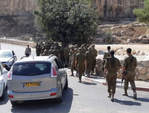
Dozens of Israeli soldiers and colonialist settlers invaded, on Sunday afternoon, Wadi ar-Rababa neighborhood in Silwan town, south of the Al-Aqsa Mosque in occupied East Jerusalem, and uprooted dozens of olive trees.
Mohammad al-Fateh, a local nonviolent activist from Jerusalem, said the soldiers and colonialist settlers invaded dozens of Dunams of Palestinian lands, and started cutting and uprooting dozens of trees.
He added that the soldiers closed the entire area, and prevented the locals and even the journalists from entering it, and photographing the unfolding events.
Mohammad al-Fateh, a local nonviolent activist from Jerusalem, said the soldiers and colonialist settlers invaded dozens of Dunams of Palestinian lands, and started cutting and uprooting dozens of trees.
He added that the soldiers closed the entire area, and prevented the locals and even the journalists from entering it, and photographing the unfolding events.
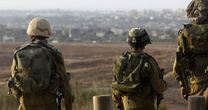
The Israeli occupation army on Sunday morning opened fire at Palestinian farmers working close to the border between the Gaza Strip and the 1948 occupied Palestinian territories.
The PIC reporter said that the Israeli forces, stationed on the Israeli side of the border fence, opened fire at Palestinian farmers east of Khan Younis city in the southern Gaza Strip.
He added that no injuries were reported in the attack.
The PIC reporter said that the Israeli forces, stationed on the Israeli side of the border fence, opened fire at Palestinian farmers east of Khan Younis city in the southern Gaza Strip.
He added that no injuries were reported in the attack.

A horde of Jewish settlers on Sunday morning destroyed dozens of olive trees and stole a large quantity of their fruits in a Palestinian grove in Tell town, west of Nablus city in the West Bank.
Palestinian farmer Mohamed Asida told the Palestinian Information Center (PIC) that he and other farmers headed for their lands in al-Khanadeq area of the town today after the Israeli occupation army prevented them from gathering crops for three days.
Asida added that when they arrived at their olive groves, they were surprised to see the enormity of destruction that happened there.
According to him, more than 50 olive trees were sabotaged and fruits from more than 100 trees were stolen.
Asida accused settlers from the nearby settlement of Havat Gilad of sabotaging their olive groves, taking advantage of the failure of local farmers to visit their lands due to Israeli military restrictions.
Palestinian farmer Mohamed Asida told the Palestinian Information Center (PIC) that he and other farmers headed for their lands in al-Khanadeq area of the town today after the Israeli occupation army prevented them from gathering crops for three days.
Asida added that when they arrived at their olive groves, they were surprised to see the enormity of destruction that happened there.
According to him, more than 50 olive trees were sabotaged and fruits from more than 100 trees were stolen.
Asida accused settlers from the nearby settlement of Havat Gilad of sabotaging their olive groves, taking advantage of the failure of local farmers to visit their lands due to Israeli military restrictions.
|
|
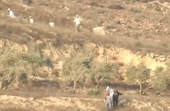
A group of illegal Israeli colonialist settlers attacked, Saturday, many Palestinians while picking their olive trees in orchards owned by Burin villagers, south of the northern West Bank city of Nablus. video
The WAFA Palestinian News Agency quoted the villages stating that the assailants came from Givat Ronen illegal colony, which was built on private Palestinian lands. They said that the assailants attacked many villages by throwing stones at them, and kicked them out of their lands, after stealing equipment the villagers use in picking their olive trees. |
The colonialist settlers also spilled buckets, which were filled with olives picked by the villages, and forced them out of their lands.
Such attacks always escalate during the olive harvest season in occupied Palestine, and including cutting and uprooting trees, bulldozing lands and even flooding them with sewage water.
Such attacks always escalate during the olive harvest season in occupied Palestine, and including cutting and uprooting trees, bulldozing lands and even flooding them with sewage water.
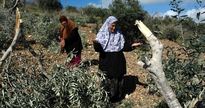
A horde of Jewish settler on Sunday morning uprooted dozens of young grapevines and olive saplings in Khader town, south of Bethlehem city in the occupied West Bank.
Local official Ahmed Salah reported that settlers from the illegal settlement of Efrat uprooted about 370 two-year-old grapevines and 30 olive saplings belonging to farmer Ibrahim Subaih in Khader town.
Salah added that the Efrat settlers, who had repeatedly sabotaged the agricultural land of Subaih, placed beehives on the land.
Israeli Colonists Uproot 400 Olive And Grapevine Saplings In Al-Khader
A group of illegal Israeli colonialist settlers invaded, earlier Sunday, Palestinian lands in the al-Khader town, south of the West Bank city of Bethlehem, and uprooted 400 grape and olive saplings.
Ahmad Salah, the coordinator of the Popular Committee against the Annexation Wall and Colonies in al-Khader, said the Israeli assailants came from the nearby Efrat illegal colony, which was built on private Palestinian lands, south of the town.
Salah added that the colonists uprooted 370 grape saplings, and 30 olive saplings, which were planted less than two years ago by a local farmer, identified as Ibrahim Suleiman Sbeih, in his land in the al-Hareeqa area.
He also stated that such attacks and violations have recently escalated in the town, and added that, just a few days ago, the illegal colonists uprooted dozens of olive and grape saplings, owned by a local farmer, identified as Ibrahim Hamdan Mousa.
Local official Ahmed Salah reported that settlers from the illegal settlement of Efrat uprooted about 370 two-year-old grapevines and 30 olive saplings belonging to farmer Ibrahim Subaih in Khader town.
Salah added that the Efrat settlers, who had repeatedly sabotaged the agricultural land of Subaih, placed beehives on the land.
Israeli Colonists Uproot 400 Olive And Grapevine Saplings In Al-Khader
A group of illegal Israeli colonialist settlers invaded, earlier Sunday, Palestinian lands in the al-Khader town, south of the West Bank city of Bethlehem, and uprooted 400 grape and olive saplings.
Ahmad Salah, the coordinator of the Popular Committee against the Annexation Wall and Colonies in al-Khader, said the Israeli assailants came from the nearby Efrat illegal colony, which was built on private Palestinian lands, south of the town.
Salah added that the colonists uprooted 370 grape saplings, and 30 olive saplings, which were planted less than two years ago by a local farmer, identified as Ibrahim Suleiman Sbeih, in his land in the al-Hareeqa area.
He also stated that such attacks and violations have recently escalated in the town, and added that, just a few days ago, the illegal colonists uprooted dozens of olive and grape saplings, owned by a local farmer, identified as Ibrahim Hamdan Mousa.
13 oct 2018
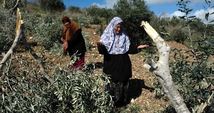
Despite the humanitarian crisis in Gaza, Israel’s Defence Minister Avigdor Lieberman, Friday, ordered a halt to any further fuel deliveries to the Hamas controlled Gaza Strip. Tuesday was the first delivery of Qatari bought fuel.
MWC news reports that this UN-brokered deal allows fuel paid for by Qatar to enter through Israel, with UN monitoring. Qatar has provided fuel to Gaza strip‘s only power plant. An official from Qatar stated that the fuel is “to avert an escalation in the existing humanitarian disaster from becoming worse.
Lieberman’s office announced on Friday that this move was “in response to attacks against Israeli soldiers and civilians.” Lieberman also cited “riots” along the fence dividing Israel and Gaza, including a beach protest. The report also stated that Israel would “not tolerate a situation in which fuel tankers are allowed to enter Gaza on the one hand, while terror and violence are used against IDF soldiers and Israeli citizens on the other.”
The statement also blames Hamas for “welcoming any terrorist attack, and accuses Hamas of encouraging Palestinians from Gaza and the West Bank to carry out attacks against Israeli citizens”.
The two latest attacks on Israeli soldiers and citizens, happened in the West Bank, which is ruled by the Fateh party and not Hamas. A senior official close to Palestinian President Mahmoud Abbas told Azzam al-Ahmad that there will be retaliatory measures, if the fuel deliveries continued. Many attempts at restoring the Fateh party to power in Gaza have failed.
MWC news reports that this UN-brokered deal allows fuel paid for by Qatar to enter through Israel, with UN monitoring. Qatar has provided fuel to Gaza strip‘s only power plant. An official from Qatar stated that the fuel is “to avert an escalation in the existing humanitarian disaster from becoming worse.
Lieberman’s office announced on Friday that this move was “in response to attacks against Israeli soldiers and civilians.” Lieberman also cited “riots” along the fence dividing Israel and Gaza, including a beach protest. The report also stated that Israel would “not tolerate a situation in which fuel tankers are allowed to enter Gaza on the one hand, while terror and violence are used against IDF soldiers and Israeli citizens on the other.”
The statement also blames Hamas for “welcoming any terrorist attack, and accuses Hamas of encouraging Palestinians from Gaza and the West Bank to carry out attacks against Israeli citizens”.
The two latest attacks on Israeli soldiers and citizens, happened in the West Bank, which is ruled by the Fateh party and not Hamas. A senior official close to Palestinian President Mahmoud Abbas told Azzam al-Ahmad that there will be retaliatory measures, if the fuel deliveries continued. Many attempts at restoring the Fateh party to power in Gaza have failed.
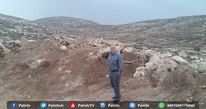
The Israeli occupation forces (IOF) on Saturday blocked several roads in Kafr Qaddum village, east of Qalqilya, with sand barriers.
Popular resistance coordinator Murad Shtewi said that the IOF, accompanied by a military bulldozer, stormed the village and closed different roads.
Shtewi said that Palestinian youths clashed with the IOF soldiers who heavily fired teargas canisters, noting that an elderly woman fainted after a gas canister fell in her house yard.
The Palestinian activist added that the Israeli bulldozer destroyed a main water line in the village, and, further, the IOF prevented the village council staff from repairing it.
Army Destroys Waterline in Kufr Qaddoum
Israeli forces, on Saturday, destroyed a water pipeline and sealed several roads in the village of Kafr Qaddoum, near Qalqilia city, in the occupied West Bank, local sources said.
Morad Shtewi, coordinator of the popular resistance in the village, told WAFA that Israeli army accompanied by a bulldozer broke into the village, destroyed a main water pipeline and sealed several roads.
Israeli measures in the village sparked confrontations with local residents, upon which an old woman was reportedly hit by a teargas canister, in her mouth, by the soldiers.
Popular resistance coordinator Murad Shtewi said that the IOF, accompanied by a military bulldozer, stormed the village and closed different roads.
Shtewi said that Palestinian youths clashed with the IOF soldiers who heavily fired teargas canisters, noting that an elderly woman fainted after a gas canister fell in her house yard.
The Palestinian activist added that the Israeli bulldozer destroyed a main water line in the village, and, further, the IOF prevented the village council staff from repairing it.
Army Destroys Waterline in Kufr Qaddoum
Israeli forces, on Saturday, destroyed a water pipeline and sealed several roads in the village of Kafr Qaddoum, near Qalqilia city, in the occupied West Bank, local sources said.
Morad Shtewi, coordinator of the popular resistance in the village, told WAFA that Israeli army accompanied by a bulldozer broke into the village, destroyed a main water pipeline and sealed several roads.
Israeli measures in the village sparked confrontations with local residents, upon which an old woman was reportedly hit by a teargas canister, in her mouth, by the soldiers.
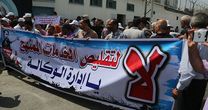
The Canadian government announced that it intends to provide emergency financial assistance to the UN Relief and Works Agency for Palestine Refugees in the Near East (UNRWA), which is suffering from a severe financial crisis due to United States suspending its funding.
The Canadian Foreign Ministry released a statement on Friday, confirming that Canada’s support of up to $50 million over two years for Palestinian refugees through the UNRWA.
Of the support announced, up to $40 million will contribute to meeting the basic education, health and livelihood needs of millions of Palestinian refugees, especially women and children. The funding will also contribute to stability in the region by providing basic services to people whose needs would otherwise be unmet.
Furthermore, up to $10 million of Canada’s support will provide emergency life-saving assistance to more than 460,000 Palestinian refugees in Syria and Lebanon, through UNRWA’s Emergency Appeal for the Syria regional crisis.
Along the same line, Canada will also provide up to $12.5 million for Right to Play International.
With support from the Government of Canada, Right to Play International will collaborate with UNRWA to help create a more inclusive environment for Palestinian refugee children and to respond to existing educational gaps and needs in the West Bank and Gaza.
The Canadian Foreign Ministry released a statement on Friday, confirming that Canada’s support of up to $50 million over two years for Palestinian refugees through the UNRWA.
Of the support announced, up to $40 million will contribute to meeting the basic education, health and livelihood needs of millions of Palestinian refugees, especially women and children. The funding will also contribute to stability in the region by providing basic services to people whose needs would otherwise be unmet.
Furthermore, up to $10 million of Canada’s support will provide emergency life-saving assistance to more than 460,000 Palestinian refugees in Syria and Lebanon, through UNRWA’s Emergency Appeal for the Syria regional crisis.
Along the same line, Canada will also provide up to $12.5 million for Right to Play International.
With support from the Government of Canada, Right to Play International will collaborate with UNRWA to help create a more inclusive environment for Palestinian refugee children and to respond to existing educational gaps and needs in the West Bank and Gaza.
11 oct 2018
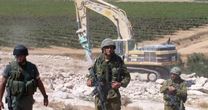
Israeli bulldozers on Thursday leveled Palestinian cultivated lands in al-Khader town, south of Bethlehem, and uprooted dozens of olive trees.
Coordinator for the local anti-settlement committee Ahmad Salah said the Israeli occupation authorities bulldozed cultivated land lots covering an area of five dunums.
The measure was carried out under the pretext that the targeted tracts, belonging by the Palestinian farmer Ibrahim Hamdan, are state “property”.
The occupation authorities also chopped 100 olive seedlings planted in the area.
Coordinator for the local anti-settlement committee Ahmad Salah said the Israeli occupation authorities bulldozed cultivated land lots covering an area of five dunums.
The measure was carried out under the pretext that the targeted tracts, belonging by the Palestinian farmer Ibrahim Hamdan, are state “property”.
The occupation authorities also chopped 100 olive seedlings planted in the area.

The Israeli occupation forces on Thursday morning knocked down Palestinian structures in the northern Jordan Valley.
According to local, sources, Israeli army troops showed up at the demolition scene and destroyed residential structures along with agricultural facilities and others for raising livestock in al-Hadidiya village, in the northern Jordan Valley.
The demolished structures are owned by the Palestinian citizen Omar Besharat, the same sources added.
The demolition process was reportedly carried out by the Israeli occupation forces under the guise of unlicensed construction.
According to local, sources, Israeli army troops showed up at the demolition scene and destroyed residential structures along with agricultural facilities and others for raising livestock in al-Hadidiya village, in the northern Jordan Valley.
The demolished structures are owned by the Palestinian citizen Omar Besharat, the same sources added.
The demolition process was reportedly carried out by the Israeli occupation forces under the guise of unlicensed construction.
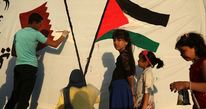
Qatar on Wednesday announced its decision to allot $150 million in aid for the blockaded Gaza Strip, a day after fuel purchased by the Gulf state arrived at the only power station in the coastal enclave.
A statement from Doha's foreign ministry said the money had been pledged via the Qatar Development Fund, the government body responsible for distributing the country's foreign aid.
"Under the directives of His Highness Sheikh Tamim bin Hamad al-Thani, the Emir of Qatar, the Qatar Development Fund has pledged $150 million in humanitarian aid to alleviate the humanitarian crisis in the besieged Gaza Strip," the ministry said.
It added that the United Nations Development Program would oversee distribution of the aid.
The UN estimated the value of Qatar's earlier donation of fuel at $60 million.
The world body says Israel's 11-year blockade of the enclave has resulted in a "catastrophic" humanitarian situation.
Gaza's two million residents endure dire living conditions including a shortage of safe drinking water and regular power cuts, partly due to a lack of fuel for the strip's power station.
In a Wednesday statement, Hamas spokesperson Abdeal Latif al-Qanoa said the shipment of Qatar-donated fuel for the sole power plant in Gaza is the first step to alleviate the plight of the Palestinian people in the Gaza Strip.
He confirmed that this move would be followed by other actions regardless of the Palestinian Authority’s consent.
A statement from Doha's foreign ministry said the money had been pledged via the Qatar Development Fund, the government body responsible for distributing the country's foreign aid.
"Under the directives of His Highness Sheikh Tamim bin Hamad al-Thani, the Emir of Qatar, the Qatar Development Fund has pledged $150 million in humanitarian aid to alleviate the humanitarian crisis in the besieged Gaza Strip," the ministry said.
It added that the United Nations Development Program would oversee distribution of the aid.
The UN estimated the value of Qatar's earlier donation of fuel at $60 million.
The world body says Israel's 11-year blockade of the enclave has resulted in a "catastrophic" humanitarian situation.
Gaza's two million residents endure dire living conditions including a shortage of safe drinking water and regular power cuts, partly due to a lack of fuel for the strip's power station.
In a Wednesday statement, Hamas spokesperson Abdeal Latif al-Qanoa said the shipment of Qatar-donated fuel for the sole power plant in Gaza is the first step to alleviate the plight of the Palestinian people in the Gaza Strip.
He confirmed that this move would be followed by other actions regardless of the Palestinian Authority’s consent.
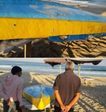
Israeli navy ships attacked, on Thursday morning, Palestinian fishing boats in the northern part of the Gaza Strip, and abducted two sibling fishermen.
Media sources said the navy attacked the fishing boats in the al-Waha area in Beit Lahia Sea, and abducted Saddam al-Sultan, 24, and his brother Odai, 22.
Local fishermen managed to retrieve the boat of the two siblings, and towed it to the shore, after it was struck by several live rounds fired by the navy.
The navy also fired many live rounds at other fishing boats, forcing the fishermen back to the shore without being able to fish and provide for their families.
Media sources said the navy attacked the fishing boats in the al-Waha area in Beit Lahia Sea, and abducted Saddam al-Sultan, 24, and his brother Odai, 22.
Local fishermen managed to retrieve the boat of the two siblings, and towed it to the shore, after it was struck by several live rounds fired by the navy.
The navy also fired many live rounds at other fishing boats, forcing the fishermen back to the shore without being able to fish and provide for their families.
10 oct 2018

Egypt's naval forces at dawn Wednesday arrested two Palestinian fishermen off southern Gaza's shore.
Head of the Palestinian Fishermen Syndicate Nizar Ayyash told Quds Press that the Egyptian navy earlier in the day detained Sami and Ibrahim Edwan while they were fishing near the sea border between Gaza and Egypt and confiscated their boats.
Palestinian fishermen usually prefer to work near the Egyptian waters away from the attacks of Israeli gunboats.
Israel in 2006 imposed a land and sea blockade on the nearly two million Palestinians in the Gaza Strip. Fishermen are only allowed to sail within an area of 6 nautical miles.
Head of the Palestinian Fishermen Syndicate Nizar Ayyash told Quds Press that the Egyptian navy earlier in the day detained Sami and Ibrahim Edwan while they were fishing near the sea border between Gaza and Egypt and confiscated their boats.
Palestinian fishermen usually prefer to work near the Egyptian waters away from the attacks of Israeli gunboats.
Israel in 2006 imposed a land and sea blockade on the nearly two million Palestinians in the Gaza Strip. Fishermen are only allowed to sail within an area of 6 nautical miles.
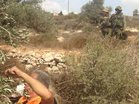
A group of Israeli soldiers, one Israeli policeman, and one Israeli settler harassed a group of Palestinian and international olive pickers in As-Sawiya village yesterday, demanding identification and threatening to expel the harvesters from the area.
Soon after the group began work, they noticed security vehicles from the nearby settlement of Alia arrive and park along the settler road above them.
The occupants of the vehicle got out of the car and stood along the road for some time, taking photographs of the olive pickers.
Soon thereafter, a team of Israeli soldiers arrived, along with an Israeli police officer in an Israeli police vehicle. The soldiers and police officer immediately approached the olive pickers and asked for IDs.
One Israeli soldier filmed the entire interaction with his mobile phone, while the police officer photographed the passports of all the international harvesters. He returned the passports immediately, but held onto the Palestinians’ IDs for a much longer period of time, walking away from the group to make a phone call and visibly sorting through the IDs.
After the phone call, he appeared to photograph one or more of the Palestinian IDs before returning them. The officer then tried to tell the group that they needed to leave. The team refused, with the Palestinians insisting that this was their land and they were there for the olive harvest.
During the confrontation, a settler came and sat nearby, watching. After the confrontation, the settler, along with two Israeli soldiers, remained on the scene for an additional 20-30 minutes, trailing the olive pickers.
Eventually all Zionists left and the rest of the day’s harvest proceeded without incident.
As-Sawiya is slowly being surrounded by Alia as it expands along three sides of the village and encroaches on its land. The particular area being harvested yesterday was among the closest to the Alia settlement.
Soon after the group began work, they noticed security vehicles from the nearby settlement of Alia arrive and park along the settler road above them.
The occupants of the vehicle got out of the car and stood along the road for some time, taking photographs of the olive pickers.
Soon thereafter, a team of Israeli soldiers arrived, along with an Israeli police officer in an Israeli police vehicle. The soldiers and police officer immediately approached the olive pickers and asked for IDs.
One Israeli soldier filmed the entire interaction with his mobile phone, while the police officer photographed the passports of all the international harvesters. He returned the passports immediately, but held onto the Palestinians’ IDs for a much longer period of time, walking away from the group to make a phone call and visibly sorting through the IDs.
After the phone call, he appeared to photograph one or more of the Palestinian IDs before returning them. The officer then tried to tell the group that they needed to leave. The team refused, with the Palestinians insisting that this was their land and they were there for the olive harvest.
During the confrontation, a settler came and sat nearby, watching. After the confrontation, the settler, along with two Israeli soldiers, remained on the scene for an additional 20-30 minutes, trailing the olive pickers.
Eventually all Zionists left and the rest of the day’s harvest proceeded without incident.
As-Sawiya is slowly being surrounded by Alia as it expands along three sides of the village and encroaches on its land. The particular area being harvested yesterday was among the closest to the Alia settlement.

The first truckload of Qatari-funded fuel, of three shipments (truckloads), entered the besieged Gaza Strip on Tuesday afternoon, via the Kerem Shalom border crossing.
Three shipments of Qatari-funded fuel were allowed entry to the Gaza Strip by Israeli authorities for Gaza’s only power plant.
Ma’an sources said that a total of six truckloads carrying 450 liters of fuel are expected to enter the Gaza Strip, on Tuesday.
The Palestinian Authority (PA) objected to the Qatari move, as the entry of fuel shipments was not done in coordination with it.
Gaza’s daily demand of power is between 450 to 500 Megawatts. However, the enclave has struggled for years with power shortages due to limited fuel access and degraded infrastructure.
In 2012, the UN warned that Gaza could become uninhabitable by 2020 if current trends were not altered. However, in another report released in July 2017, the UN said that “life for the average Palestinian in Gaza is getting more and more wretched,” and that for the majority of Gaza’s residents, the territory may already be unlivable.
Three shipments of Qatari-funded fuel were allowed entry to the Gaza Strip by Israeli authorities for Gaza’s only power plant.
Ma’an sources said that a total of six truckloads carrying 450 liters of fuel are expected to enter the Gaza Strip, on Tuesday.
The Palestinian Authority (PA) objected to the Qatari move, as the entry of fuel shipments was not done in coordination with it.
Gaza’s daily demand of power is between 450 to 500 Megawatts. However, the enclave has struggled for years with power shortages due to limited fuel access and degraded infrastructure.
In 2012, the UN warned that Gaza could become uninhabitable by 2020 if current trends were not altered. However, in another report released in July 2017, the UN said that “life for the average Palestinian in Gaza is getting more and more wretched,” and that for the majority of Gaza’s residents, the territory may already be unlivable.
Page: 35 - 34 - 33 - 32 - 31 - 30 - 29 - 28 - 27 - 26 - 25 - 24 - 23 - 22 - 21 - 20 - 19 - 18 - 17 - 16 - 15 - 14
